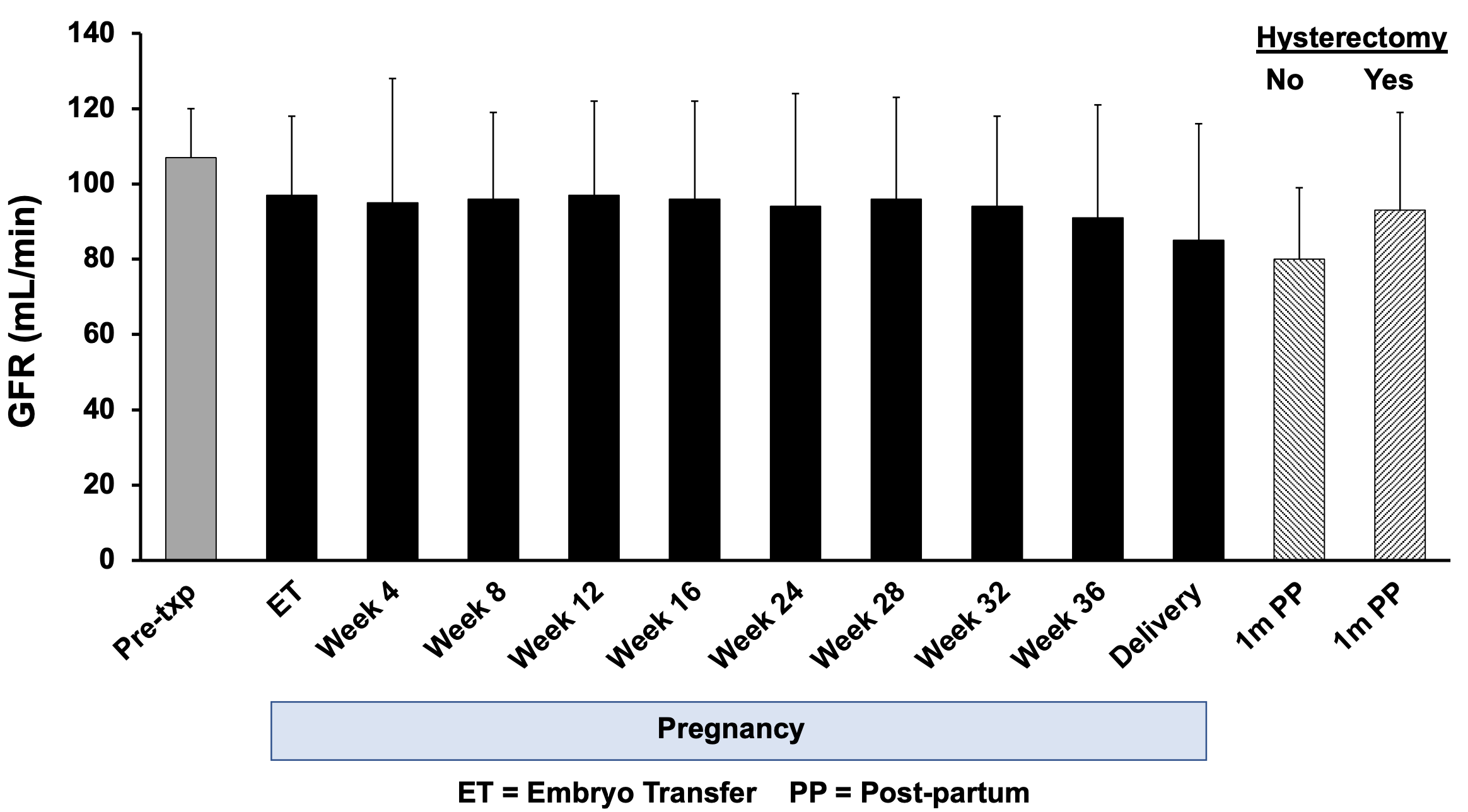A Multi-institutional Study of Renal Outcomes in Uterus Transplantation
1Hospital of the University of Pennsylvania, Philadelphia, PA, 2Department of Surgery, Baylor University Medical Center, Dallas, TX, 3Institute for Clinical and Experimental Medicine, Prague, Czech Republic, 4University of Alabama at Birmingham, Birmingham, AL
Meeting: 2021 American Transplant Congress
Abstract number: 7
Keywords: Pregnancy, Renal function
Topic: Basic & Clinical Science » VCA
Session Information
Session Name: VCA: Basic and Clinical
Session Type: Rapid Fire Oral Abstract
Date: Saturday, June 5, 2021
Session Time: 4:30pm-5:30pm
 Presentation Time: 4:40pm-4:45pm
Presentation Time: 4:40pm-4:45pm
Location: Virtual
*Purpose: Pregnancy and calcineurin inhibitor-based immunosuppression represent potential renal stressors for uterus transplant (UTx) recipients, many of whom have Mayer-Rokitanksy-Kuster-Hauser (MRKH) syndrome and associated renal abnormalities. Renal dysfunction during pregnancy can contribute significantly to pregnancy complications such as pre-eclampsia (PE) and gestational HTN (gHTN). Nevertheless, studies of renal function in UTx patients are lacking.
*Methods: We collected demographic and clinical outcome data on UTx recipients transplanted from 2016-2020 at Prague (n=3), Baylor (n=12) and UPenn (n=2). Only UTx patients who achieved live birth during the study period were analyzed (16/17 patients). Acute kidney injury (AKI) was defined using AKIN criteria. Serum creatinine measurements and glomerular filtration rate (GFR), estimated using the CKD-EPI equation, were compared at different time points using a paired t test; a p value <0.05 was considered significant.
*Results: The average age at UTx was 28.9 ±4.3 yrs and the most common reason for transplantation was MRKH in 93.4%; only one patient had a solitary kidney. A second pregnancy occurred in 2 women but these data were not included in this analysis. Pretransplant renal function was normal for all UTx recipients (mean serum creatinine 0.75mg/dL± 0.1; mean eGFR 107ml/min±13). An increase in serum creatinine >=0.3mg/dL was noted in 37.5% after UTx; likewise, mean serum creatinine at embryo transfer was significantly higher than pretransplant (0.84mg/dL±0.2, p=0.035). Four patients (25%) developed AKI Stage I in the third trimester. 50% developed a hypertensive disease of pregnancy and 4 (25%) developed PE. GFR at embryo transfer was numerically lower in women who developed PE (82ml/m±27 vs. 102ml/m±17; p=0.11) and this difference was significant at 16 weeks’ gestation (72ml/m±25 vs. 106m/m±21, p=0.02). Complicated pregnancies were associated with a shorter gestational duration. GFR improved for all patients after hysterectomy and cessation of immunosuppression but did not always return to pretransplant levels postpartum (Figure1).
*Conclusions: AKI is common among UTx recipients and is associated with pregnancy complications. Studies of kidney function in this population are needed to both improve risk counseling for UTx candidates and guide patient selection.
To cite this abstract in AMA style:
Sawinski D, Johannesson L, Kristen J, Fronek J, Porrett P. A Multi-institutional Study of Renal Outcomes in Uterus Transplantation [abstract]. Am J Transplant. 2021; 21 (suppl 3). https://atcmeetingabstracts.com/abstract/a-multi-institutional-study-of-renal-outcomes-in-uterus-transplantation/. Accessed March 1, 2026.« Back to 2021 American Transplant Congress

